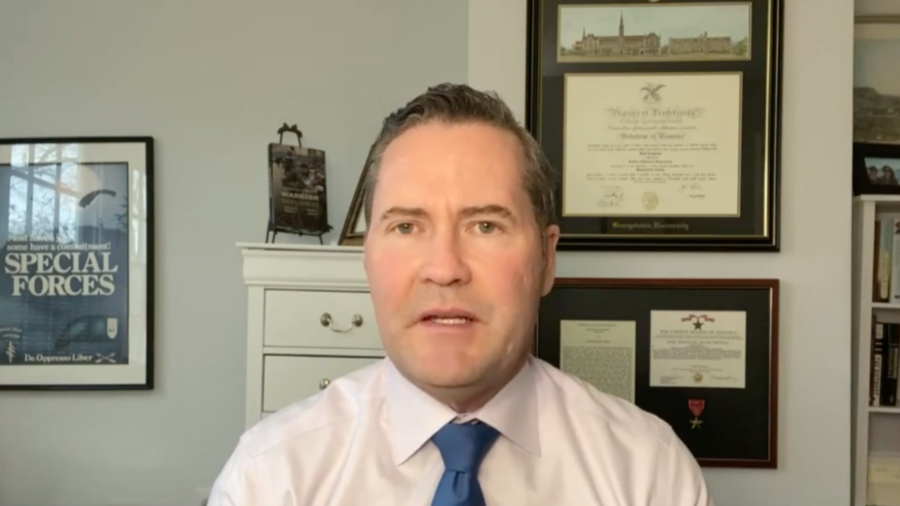A recent joint Chinese and Russian naval patrol off the coast of Alaska has Rep. Mike Waltz (R-Fla.) concerned about the size of the U.S. Navy and its ability to deter hostile nations.
Over the weekend, reports broke that 11 Chinese and Russian warships sailed through the Bering Sea and passed Alaska. The United States deployed four of its own warships in response.
Mr. Waltz is an officer in the Army National Guard and leads the House Armed Service Committee’s subcommittee on military readiness. His initial reaction to the encounter near Alaska was one of criticism for President Joe Biden’s administration, which has asked to budget for fewer ships than it has sought to decommission in the past two years.
“I think the takeaway we need to have is multifold. One, we could only muster for ships to go and surveil and track and deter their 11 warships. That was just off Alaska’s coast,” Mr. Waltz told NTD News, a sister media outlet of The Epoch Times. “And it speaks to the fact that in the past several defense budgets under President Biden, we have retired more ships. … The Navy is actually getting smaller, while China is doubling the size of their navy and now has the largest navy in the world.”
Navy officials have described the shipbuilding plans as a means of shifting priorities away from costly, older ships and ships with troubled production runs like littoral combat ships. Officials have said the Biden administration’s shipbuilding plans will go toward funding top-priority ships like the Columbia-class submarine.
Unlocking the Arctic and a New Cold War
Mr. Waltz said the incident near Alaska also serves as a warning sign of rising Chinese and Russian interests in that region. Russia is close to the Arctic, and the Bering Strait separates Russian territory from Alaska by about 51 miles at the narrowest point.
“With the ice cap shrinking, it’s opening up new shipping lanes to the north of Canada and the north of Russia, but also huge reserves of oil and gas, and massive, untouched fisheries that both the Chinese and the Russians want to dominate,” he said.
“So we just need a real wake-up call here in terms of what’s going on in the new cold war that the Chinese Communist Party has entered in with the United States, and they were clearly sending a message with this flotilla.”
Whereas Russia formed the major component of the Soviet Union during the Cold War of the second half of the 20th century, Mr. Waltz said this new cold war is one where China is in the lead and Russia is a “junior partner.” Nevertheless, Mr. Waltz said relations between Russia and China are an “unholy alliance” and U.S. officials “have to take it very seriously.”
US Detterence Vital for Taiwan
In future instances where China and Russia send ships near the United States, Mr. Waltz said America needs to be able to meet those foreign ships with “more than just a couple” of its own. He said the United States also needs to be able to respond to incidents like this one near Alaska by sending similar numbers of ships near China.
“I think we send 11, 12 ships through the Taiwan Strait, and say, ‘You know what, if you want to escalate, we can do that, too,'” the Florida Republican said. “That’s how deterrence works, particularly with dictatorships. They are going to push and push and push. And if they’re met with appeasement, if they hit mush, so to speak, they’re going to push even further. If they hit steel and they hit resolve, then they know where the red lines are and where they need to stop. That’s how dictatorships like what we see in Beijing and Moscow respond.”
Taiwan has become a focal point for U.S. policy in the Pacific. The island nation is self-governing, though the Chinese Communist Party (CCP) contends that the island is part of China’s territory. The United States has maintained a position of strategic ambiguity, avoiding outright recognition of Taiwan’s independent governance while carrying on some limited relations with the island. As the CCP has increasingly alluded to plans to assert control over Taiwan, many U.S. lawmakers have supported increased military support for the island.
“I think the time has come to transition from strategic ambiguity to strategic clarity,” Mr. Waltz said of Taiwan. “When you have ambiguity, dictatorships think they just might get away with it, which is what happened when it comes to Russia and Ukraine. Our lack of clarity there let [Russian President Vladimir Putin] think that he could get away with it.”
Mr. Waltz said a clear commitment to defend Taiwan from the Chinese regime would convince other allies to also make clear commitments in the Indo-Pacific region.
“I have talked to a number of our allies in the Pacific and asked them how they will respond if we have an invasion of Taiwan. And their response has been, ‘Look, don’t press us with clarity when you yourselves aren’t clear,'” he said. “So I think we need to move to clarity not only for our allies but for our adversaries and also for the American people.”
While Mr. Waltz described the Russian invasion of Ukraine as a potential roadmap for how an undeterred China might treat Taiwan, some of his fellow Republicans have been more skeptical of the U.S. support for Ukraine. Former President Donald Trump has indicated he’d prioritize peace negotiations over military aid to Ukraine if he wins the 2024 election, and other 2024 presidential candidates have made similar remarks about pursuing peace in Ukraine.
Businessman and 2024 Republican candidate Vivek Ramaswamy has suggested the United States could use peace negotiations between Russia and Ukraine, and offer improved relations with Russia in exchange for Moscow distancing itself from Beijing.

